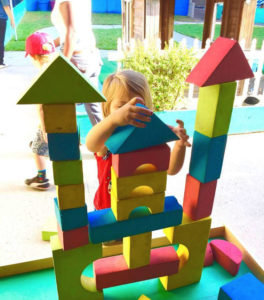Play
PLAY in Town and Country Preschool
Explore! Create! Sing! Read! and Think!
When you think back to your childhood, what happy, play memories come to mind?
~BUILDING A FORT ~ DIGGING AND CREATING IN THE SANDBOX~
~MAKING AND PLAYING WITH HOMEMADE PLAYDOUGH~
Memories of joyful and meaningful play experiences help emotionally bind families together, even long after their children are grown. Are our children experiencing the same kind of joyful, meaningful, and family bonding in their play?
Here are five elements essential to meaningful play that not only create those rich memories we treasure, but are essential in character development.
 1. Children make their own decisions…
1. Children make their own decisions…
When children choose how to play for themselves, they experience freedom of making choices. They also begin to see connections between choice and the consequences or results of that decision. Play can shape how children acquire thinking skills, how children make sense of the world, and how they develop language skills.
Play supports all realms of development. The type of toys or materials parents offer can help their children make more meaningful decisions. For example, a child can imagine a block to be a fire truck or any number of things whereas a toy fire truck, is usually used as a fire truck. Foam pieces, little wooden sticks, ribbon scraps and other reusable materials are all open-ended items that inspire creative thinking and personal delight when children use them to make something no one has ever made before. Play supports intellectual growth through multi-sensory experiences, problem solving, and mastering abstract symbolism.
2. Children are intrinsically motivated.
The impulse to play comes from a natural desire to understand the world. Play builds children’s social skills by them learning and practicing social roles, rules of social interactions, and it decreases egocentrism. The play impulse is as strong as your child’s desire for food and sleep. Through play, young children can master emotional issues and promote a positive self-image. Children eventually find it more important to be part of the play with friends than to satisfy their own wants and needs, which overall helps them learn self-control. Self-control is a wonderful skill to master.
3. Children become immersed in the moment.
When children are engrossed in play, they sometimes lose awareness of their surroundings, time and space. In this risk-free atmosphere where reality is suspended, children have the security and safety they need to experiment, try new ideas, and investigate the laws of nature. This is a very productive thing to develop!
4. Play is spontaneous, not scripted.
Often, play is totally unplanned. Other times, play is planned but a child may impulsively make a change, because a toy does not cooperate or an additional person or circumstance has come into the situation. This sense of the unknown provides children with opportunities to develop flexibility in their thinking and decision making, which is a vital life skill.
 5. Play is enjoyable.
5. Play is enjoyable.
Play always has an emotional response attached to it. Without this emotional connection, the experience is simply an activity; it is not PLAY. Enjoyment is the direct result of engaging in play. It is FUN! These five essential elements of play outline why play provides your child with a rich experience and supports a healthy, whole child. Children confident, with the ability to create, regulate their emotions, make friends and good decisions. This is definitely what we want for our children!
